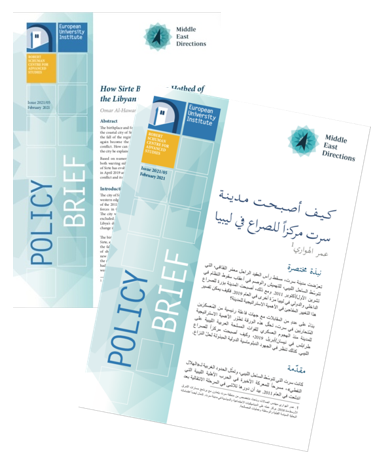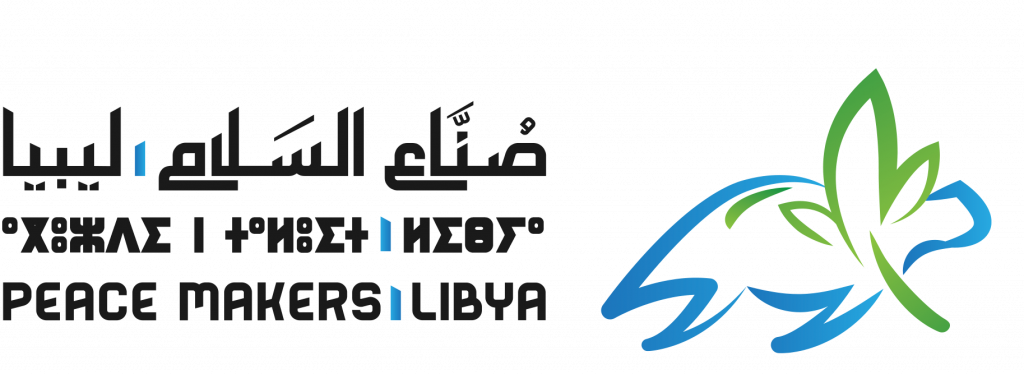The Libya Initiative was founded in 2015 with a central focus on three areas: policy research on Libya with a strong fieldwork component, support for homegrown mediation initiatives and policy dialogues.

POLICY RESEARCH
The research track aims to inform policymakers in both Europe and Libya by producing policy-relevant analysis on the key dynamics and ongoing transformations in the country. Policy analysis is based on fieldwork and is produced in close collaboration with local analysts and researchers, with dissemination in both Arabic and English.
MENTORSHIP
The research track also includes a mentorship initiative aimed at supporting the creation of a network of Libya-based policy analysts.

i
DIALOGUE SUPPORT
The dialogue support track is based on a close partnership with the ‘Peacemakers Libya’ team, a group of non-political Libyan community activists from all regions of Libya. It has continued without interruption since January 2015.
It has aimed to promote and support an inclusive bottom-up reconciliation process that can strengthen the political resolution of the conflict and help it take root.
LIBYA PLATFORM
In August 2020, we launched the Dialogue Platform for Peace and Stability in Libya (‘Libya Dialogue Platform’).
It aims to establish a continual coordinated platform for dialogue and exchange between Libya’s major political forces, Libyan and international researchers and the international community on key issues for peace and stability in Libya.
It includes:
- Support to a dialogue process between Libya’s main political actors led by the Peacemakers team, addressing the conflict with an issue-based, long-term policy approach.
- Production of policy-relevant analysis and organisation of policy events aiming to support Libyan policy debates and international peace-building strategies.
#LibyaPlatform
i
ECONOMIC VISION IN TRANSITION TIMES
“Economic Vision in Transition Times” is a series of publications that aims to stimulate discussions with Libyan experts and policymakers on the most relevant options for economic reform and rehabilitation in post-conflict Libya, as well as their potential impact on politics and society.
- Angola’s Post-Conflict Economic Model: Lessons for Libya?, Ricardo Soares de Oliveira, 2022 [Arabic]
- Lebanon: How the Post War’s Political Economy Led to the Current Economic and Social Crisis, Joseph Daher, 2022, [English and Arabic]
- Morocco’s New Development Model: Lessons for Libya?, Abdellah Tourabi, 2022, [English and Arabic]
- The developmental state experience in Ethiopia and Rwanda: lessons for Libya?, Mehari Taddele Maru, 2021,
[English and Arabic] - Russia’s economic liberalisation: lessons for Libya?, Anders Åslund, 2021, [English and Arabic]
- Economic policy choices in Chile’s transition periods: lessons for Libya?, Rodrigo Fuentes and Claudio Sapelli, 2021, [English and Arabic]
- The developmental state experience in Malaysia: lessons for Libya?, Kriengsak Chareonwongsak, 2021, [English and Arabic]
THE CONSTITUTIONAL PROCESS
As a key dimension of Libya’s political debate, the constitutional process has been a specific point of focus of the policy analysis track, trying to provide objective research and recommendations on this issue.
- Libya’s elections without a constitution: a risky gamble, Nedra Cherif, 2021, [English and Arabic]
- Chile’s path to a new constitution : lessons for Libya?, Augusto Varas, 2021 [English and Arabic]
- Libya’s Constitution: Between Conflict and Compromise, Nedra Cherif, 2021 [English and Arabic]
NATIONAL RECONCILIATION
National reconciliation has become a central issue in Libya’s political process. This series of publications aims at providing Libyan and international stakeholders with comparative experiences of countries having experienced war and civil strife and how they handled the issues of peacebuilding and national reconciliation.
- National Reconciliation in Rwanda: Experiences and Lessons Learnt, Ezechiel Sentama, 2022, [English and Arabic]
- National reconciliation and peacebuilding in Algeria : lessons for Libya?, Faouzia Zeraoulia, 2022, [English and Arabic]
PUBLIC POLICIES IN TIMES OF CONFLICT
- Addressing the Water and Sanitation Crisis in Sebha, Waleed Bakako, February 2022, BLOG.
- Do more universities mean better education for young Libyans?, Libya Initiative Team, January 2022, BLOG.
- Waste Management in Tripoli: A Temporary Crisis or a long-lasting imbroglio?, Rima Ibrahim, June 2021 [English and Arabic]
- The Covid-19 Pandemic Highlights the Inadequacy of Sebha’s Healthcare Services, Rema el-Fellani, May 2021 [English and Arabic]
- Political divisions in Libya’s epicentre impede the fight against the Covid-19, Rema el-Fellani and Waleed Khaleefa, June 2020, BLOG.
- The impact of Coronavirus and the continuing war on Tripoli and Western Libya, Mohamed Saleh Belqasem, April 2020, BLOG.
LOCAL DYNAMICS IN SIRTE
- The Geneva Ceasefire Agreement: Implementation Challenges and Their Impact on Sirte, Omar Al-Hawari, September 2021, BLOG.
- Rule by the Libyan Arab Armed Forces Has Disrupted the Fragile Balance in Sirte, Omar Al-Hawari, April 2021 [English and Arabic]
- How Sirte Became a Hotbed ofthe Libyan Conflict, Omar Al-Hawari, February 2021 [English and Arabic]
- Tensions rise in Libya’s Sirte as the city becomes central to the conflict, Omar Al-Hawari, October 2020, BLOG.
- Libya’s Sirte is preparing for a war of a different kind, Omar Al-Hawari, March 2020, BLOG.
- The City in the Middle: Fragile Stability and Future Opportunities in Libya’s Sirte, Omar Al-Hawari, 2019 [English and Arabic].
OTHER PUBLICATIONS
- Salafi Politics: “Political” and “Quietist” Salafis in the Struggle for the Libyan State, Virginie Collombier, 2020, in collaboration with the Norwegian Institute for International Affairs (NUPI)
- The new war in Libya: Europe cannot afford to be caught sleeping, Virginie Collombier, April 2019.
- To engage or not to engage? Libyan Salafis and state institutions, Virginie Collombier, Fiona Barsoum, 2019, NUPI-MEDirections.
- Fulfilling Implausible Expectations. Reducing Migratory Flows from Libya amidst Porous Borders, Luca Raineri, 2018.
- The War in Derna: What’s Happening Now, and What’s Next?, Al-Zubayr Salem, 2018 [English and Arabic].
- Local Specificities of Migration in Libya: Challenges and Solutions, Abdulrahman al-Arabi, 2018 [English and Arabic].
- The crisis in Derna: Reconciliation opportunities in the midst of war?, Al-Zubayr Salem, 2018 [English and Arabic].
- Tribes and Global Jihadism, Virginie Collombier and Olivier Roy (eds), Hurst Publishers, 2017.
- Make Politics, Not War: Armed Groups and Political Competition in Post-Qaddafi Libya in Out of the Inferno? Rebuilding Security in Iraq, Libya, Syria and Yemen, Arab Reform Initiative, 2017.
EVENTS
- Libya’s economic future: Which vision? Which priorities?, Hybrid Conference, Libya Dialogue Platform for Peace and Stability, 14-15 July 2021
- Public Policies in Times of Conflict: Lessons From Waste management and Health Services in Libya, Online Roundtable, 15/06/2021
- Libya’s endless war: Tripoli’s battlefield and its impact on the south, Roundtable, 03/12/2019
- Re-thinking Libya’s Economic Conflict, Workshop, 13/02/2019
- Migration and Radicalisation in Libya: The Significance of Local Dynamics in Formulating Effective Policy Responses, Workshop, 05-06/07/2018
- Tribes and Global Jihadism, Workshop, 27/02/2018
- Migration Challenges: What can Libya’s Local Communities Do?, Workshop, 28/02/2017
- Libya: What Role for Local Actors?, Workshop, 01/06/2016
>> To get in touch with the Libya Initiative team, please contact us on MED.Libya@EUI.eu



